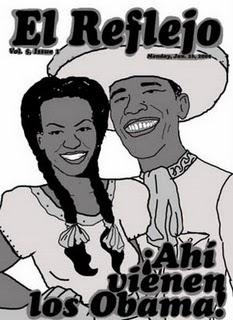El Reflejo

Long Beach is unlike any other city in Southern California; it is a place where both million dollar homes and low-income housing co-exist within mere miles of each other, it is suburban and urban, it’s an oppressive, concrete jungle that happens to be surrounded by picturesque beaches, but most compelling, perhaps, is the eclectic mix of people that call the city home. Long Beach is a true representation of the term “all walks of life.” Inhabitants include blond beach babes, immigrants from every country, a large black community, the ultra-wealthy, hordes of homeless, a thriving gay community, and a massive Latino culture, which should come as no surprise seeing as how forty percent of the city is Latino. It is these last two segments of Long Beach society that most concern the staff of El Reflejo, a small, self-published zine compiled by students of Cal State Long Beach.
El Reflejo, which means “the reflection” in Spanish, is quite literally a direct reflection of the lives of its writers. Not all of the zine’s staff members are Latino, but many of them are members of campus organizations such as FUEL (Future Underrepresented Educated Leaders) and La Raza Student Association. The content featured in the zine comes in all forms: poems, essays, confessions, drawings and all of it manages to be optimistic, angry, idealistic, tragic, and hilarious, as only young people are apt to be. Though small in size, the publication makes a big impact for students who would otherwise go unheard; either through their own self-imposed silence or because no forum previously existed for them to be heard.
There are two sections guaranteed to be in each issue: Jotos Anonimos and Mojados Anonimos, which are essentially sections cordoned off for writings pertaining to being queer and undocumented; writers can remain anonymous if they choose. Yadira Arroyo, a Chicano studies major and women’s studies minor, is one of El Reflejo’s most outspoken writers and does not pussyfoot her around her intentions for the zine. Arroyo said:
“Personally, I want to smash that macho/hyper-nationalistic stereotype of Chicano activists. I want to replace it with one of love, as corny as that sounds. Love for who you are and where you come from, but not blind love. Despite public perception, Latinos do not inherently come from a place of malice, which is often assumed in the cases of ‘lawless’ undocumented immigrants, for example. Our culture can certainly be ugly at times, but in the end we are just trying to love and survive.”
The zine, which is small and humble… and xeroxed, is a true labor of love. The publication is in no way funded by Cal State Long Beach and none of its eight core staff members get paid. Essentially, it is through the sale of nachos, hot dogs, beer, and liquor at what seems to be a constant stream of fundraisers that El Reflejo gets the meager funds it needs to continue chugging forward into its unsure future.
What began as nothing more than an idea being kicked around at a 2005 student retreat, has since blossomed into a four-year-old publication that gives students such as Pablo Ildefonso, a Chicano studies major, the chance to finally make their presence known on a campus lacking in diversity. “We exist on this campus, which is something the University tends to forget when they generalize the student experience here. Our experiences as Latinos on this campus aren’t known very well and my voice needs to be heard if there are people going through a similar things,” Ildefonso said.
Student publications have famously been the one place where young people can voice their concerns and opinions about the unsure world they are living in. It is only through the blood, sweat, and tears of the unrepresented segment of the Cal State Long Beach student body that this type of alternative media outlet can exist—and that’s not a bad thing. According to Arroyo, the staff’s efforts to keep the zine going and their pained published writings are a record of their existence on campus and it is because of their efforts that people will be able to look back and know how progressive Latino students were managing in a less-than-accepting world.
“This is our voice, our affirmation,” said Arroyo. “We produce work and it validates us in a way that society doesn’t. Mainstream, white-American, classist culture is supposed to be the stamp of approval, but with El Reflejo, we have the opportunity to nourish a beautiful arena—one that’s free from the outsider’s gaze.”